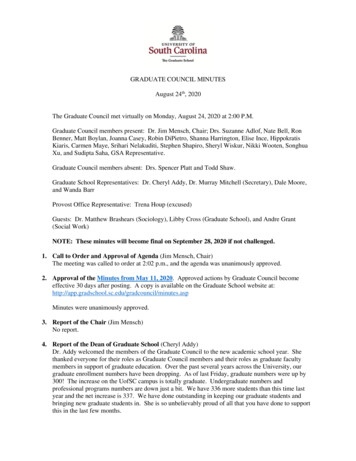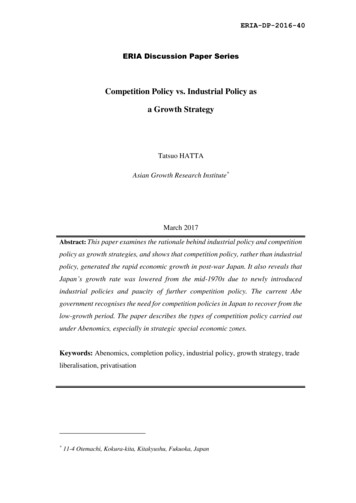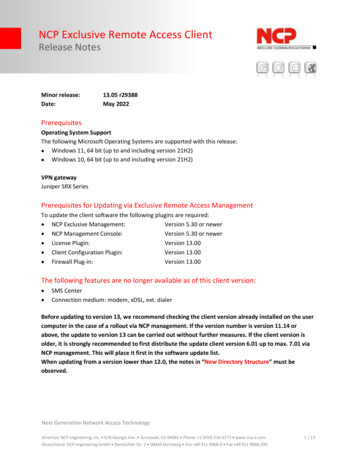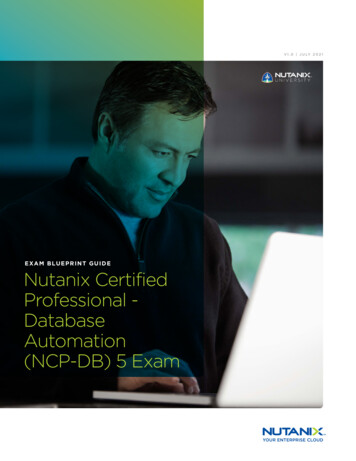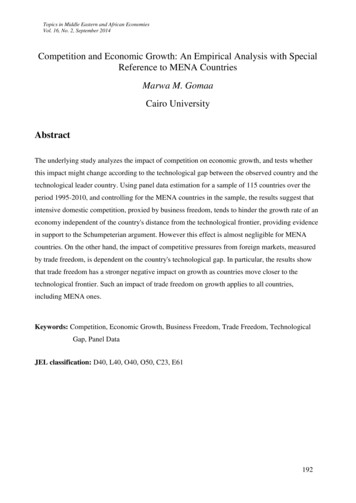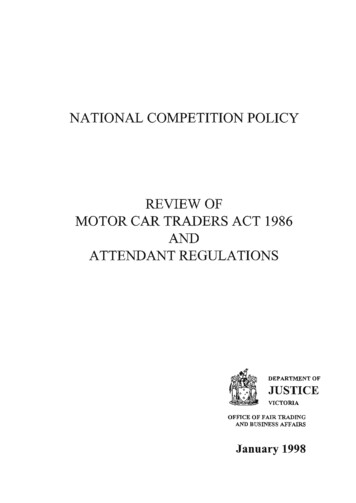
Transcription
NATIONAL COMPETITION POLICYREVIEW OFMOTOR CAR TRADERS ACT 1986ANDATTENDANT REGULATIONSDEPARTMENT OFJUSTICEVICTORIAOFFICE OF FAIR TRADINGAND BUSINESS AFFAIRSJanuary 1998
NATIONAL COMPETITION POLICYREVIEW OF MOTOR CAR TRADERS ACT 1986AND ATTENDANT REGULATIONSTABLE OF CONTENTSOVERVIEWRECOMMENDATIONS . 1EXECUTIVE SUMMARY . 2COMPETITION AND THE LEGISLATION . 2IMPROVING BUYERS' BARGAINING POSITION . 2DISCIPLINE AND REDRESS . 3LOSS RECOVERY . 4PART ONE BACKGROUND1. THE INDUSTRy . 51.1 NEW VEHICLE TRADE . 61.2 USED VEHICLE TRADE . 62. THE LEGISLATION IN OUTLINE . 72.12.22.32.4REGULATION OF INDUSTRY PARTICIPATION . 7CONDUCT REQUIREMENTS . 8COVERAGE OF REGULATION . 10MOTOR CAR TRADERS GUARANTEE FUND . IIPART TWO EFFECT OF THE REGULATION ON COMPETITION3. COMPETITION IN THE INDUSTRy . 123.1 NEW VEHICLE TRADE . 123.2 USED VEHICLE TRADE . 134. ROLE OF REGULATION . 15PART THREE ALTERNATIVE MEANS FOR ACHIEVING OBJECTIVES5. OBJECTIVES OF THE LEGISLATION . 176. LINKS BETWEEN OBJECTIVES AND RESTRICTIONS . 186.1 IMPROVING BUYERS' BARGAINING POSITION . 18Information disclosure . 18Legal requirements . 19Misrepresentation relating to product quality . 20Unconscionable conduct. 216.2 DISCIPLINING TRADERS . 226.3 LOSS RECOVERY . 23
7. ALTERNATIVE APPROACHES: IMPROVING BUYERS' BARGAINING POSITION . 257.1 ALTERNATIVES TO STATUTORY WARRANTY . . . 25Reliance on marketJorces and general laws . 25Statutory warranty on sales by all sellers . 31Statutory warranty at buyer's option (mandatory dual pricing) . 327.2 ALTERNATIVES TO THE COOLING-OFF PERIOD . 34Reliance on general contract law . 34Cooling-offperiod on sales oj used cars by all sellers . 347.3 ALTERNATIVES TO STANDARD DOCUMENTATION OF INFORMATION . 35Market provision oj inJormation . . . . . . 35Apply standard documentation oJinJormation to all sellers . 357.4 REMOVE PROHmITION ON CONSIGNMENT SELLING . . 367.5 ALTERNATIVES TO RESCISSION . 368. ALTERNATIVE APPROACHES: DISCIPLINE . 388.1 ALTERNATIVES TO LICENSING . 38Deregulation . . . . . . . . . . 38Consumer information and education strategies . . ". 38Voluntary industry code or industry self-regulation . 39Co-regrtlation . . . 40Negative licensing . 41ConclrtsioTl . 419. ALTERNATIVE APPROACHES: LOSS RECOVERY . 439.19.29.39.49.59.6MARKET MECHANISMS AND THE GENERAL LAW . . .43PRIVATE INSURANCE BY TRADERS OR BUYERS . . . 44A 'USER PAYS' GUARANTEE FUND . 46INDUSTRY- RUN GUARANTEE FUND . 46VARIABLE CONTRIBUTIONS TO EXISTING FVND . 47CONCLUSION . .4810. POTENTIAL TO STREAMLINE THE EXISTING REGULATION . 5010.1 DISQUALIFYING OFFENCES AND FITNESS AND PROPRIETY IN LICENSINGCRITERIA . 50Content oj the disqualifying offences test. . . 51SeriousTless oj the disqualifying offences test . 51Recency oJthe disqualifying offences test . 52Fitness and propriety . . . . 5210.2 INVOLVEMENT IN COMPENSATION FUND CLAIMS . . 5310.3 OTHER LICENSING CRITERIA . 54Knowledge oj Act . 54Financial capacity . . . . . . . . 54Suitable premises . . 5510.4 EXEMPTIONS . 5510.5 EMPLOYEE RESTRICTIONS . 56PART FOUR COST BENEFIT ANALYSIS OF PROPOSALS11. THE PROPOSALS IN TURN11.1 RETAIN LICENSING OF MOTORCAR TRADERS . . 59Costs . 59Benejits. 59Conclusion . . . . . 60
11.2 RETAIN TIlE MANDATORY STATUTORY WARRANTY . 60Costs . . 60Benefits . . . . . 60Conclusion . 6111.3 RETAIN OTHER KEY CONOUer REQUIREMENTS . 61Costs . 61Benefits . . . . 61Conclusion . . . 6211.4 RETAIN TIlE GUARANTEE FUND . 62Costs . 62Benefits . 62Conclusion . . . 6311.5 DEFINE TIlE ELIGIDILITY CRITERION OF SUITABLE PREMISES . 63Costs . 63Benefits . . . . 63Conclusion . . . . . 6311.6 REMOVE THE DISQUALIFYING CRITERION RELATING TO RUNNING A BUSINESS'EFFICIENTLY' . 64Costs . . . 64Benefits . 64Conclusion . . . 6411.7 PROTEer THE RESOURCES OF TIlE GUARANTEE FUND BY CLARIFYINGGROUNDS FOR CLAIMS AGAINST TIlE FUND . 64Costs . . 64Benefits . 64Conclusion . . . 6412. CONCLUSIONAPPENDIXA TERMS OF REFERENCE . iLegislation to be Reviewed . iReform Options . . . . iReview Arrangements . iiB CROSS REFERENCES TO REPORT . 11REFERENCES
OVERVIEWRECOMMENDA nONSConsumer rights and remedies established under the Motor Car Traders Act 1986should be retained, and the licensing of motor car traders should continue.While not necessary on the grounds of promoting competition, the eligibility criteriarelating to fitness to be licensed on probity grounds could be rationalised. Twospecific recommendations are made on this point. As these issues are underconsideration in the broader context of proposals to re-organise business licensingprocesses in establishing a Victorian Civil and Administrative Tribunal, it hasotherwise been deemed appropriate to defer to that process.While the overall conclusion of the review is that the regulatory requirementsimposed on the industry have negligible impact on competitive rivalry and arejustified in terms of the public benefits they generate, the review has identified someareas where regulatory objectives could be achieved with less regulation.The recommendations are that:I.The eligibility criterion for a trader to have 'suitable premises' be replaced by acriterion that a trader have all relevant planning approvals for any premises atwhich the trader carries on business, or proposes to carry on business, as amotor car trader.2.The eligibility criterion for a trader to carry on a motor trading business'efficiently' should be removed.3.The potential for unwarranted claims on the Motor Car Traders' GuaranteeFund should be reduced by: ensuring that a financier cannot claim in relation to a trader's failure tocancel a security interest where the debtor was a motor car trader; ensuring that a financier cannot claim where a vehicle has beenrepossessed from a trader's premises and sold at a loss; and specifYing the provisions in relation to which a claim can be made forloss incurred from the failure of a trader 'to comply with [the] Act' assections 36 (prohibition on consignment selling), 38 (prohibition onodometer tampering), 43(3) (disposal of a trade-in vehicle during thecooling-off period), s54(1) (traders' obligations with respect towarranties), and s56(2) (special conditions purporting to limit ormodifY warranty obligations).
EXECUTIVE SUMMARYThe review examines the scope for reform of the Motor Car Traders Act 1986 andMotor Car Traders Regulations 1987 under National Competition Policy. It followsthe steps established in the Victorian Government's Guidelines for the Review ofLegislative Restrictions on Competition (Th e Guidelines).Historically regulatory mechanisms have been viewed as necessary in the motortrading industry to protect the public interest in this important sector of the consumermarket. Legislation governing motor car traders was first enacted in Victoria in1973 and has undergone significant amendment twice in the last ten years. The mostrecent review conducted in 1994, and the amendments proposed as a result, involveda consideration of competition issues in the industry.COMPETITION AND THE LEGISLATIONThe review finds that there are strong competitive pressures in the motor tradingindustry in the markets for both new and used cars and that competitive pressureswould not be significantly enhanced if the basic regulatory scheme were removed oraltered.Nonetheless, screening of participants in the industry through the licensingrequirement and compliance with conduct requirements in particular may have somemarginal effect on traders' cost levels. As a result, a review of the objectives of thelegislation, alternative means for achieving them and an assessment of the benefitsand costs of retaining particular requirements where viable alternatives do not existwas undertaken.The review identifies the major objective of the legislation as one of addressingmarket failure due to information asymmetry inherent in the nature of motor vehicletransactions. This information asymmetry reflects the fact that motor vehicles areinfrequently purchased, technically complex and expensive items which areessentially experience goods. The legislation attempts to address this problemprimarily by improving consumers' bargaining position by both correcting, andcompensating for, information asymmetry through a number of avenues. Otherrelated objectives include effective disciplining of traders and allowing recovery oflosses as a result of dishonest trader conduct.IMPROVING BUYERS' BARGAINING POSITIONThe review finds the requirement for information disclosure and standardiseddocumentation by traders to be minimally burdensome and essential for promotinginformed and efficient transactions in the marketplace. The information required isgenerally readily available to traders and would often be recorded in some form inany case. The benefits in terms of improved functioning of the market clearlyoutweigh the costs.2
A mandatory warranty provides buyers with some assurance of vehicle reliability atthe time of sale and prevents misrepresentation on the part of traders with respect toquality. The review finds the mandatory warranty an efficient means for improvingbuyers' bargaining position with respect to this important product attribute and pricenegotiating point. The potential for traders to supply warranties voluntarily isexamined as are other means for obtaining information on product quality such asindependent third party testing by the RACV. The review finds that these options doprovide key information to buyers but suffer from a number of drawbacks whichrender them ineffective as a general means for improving buyers' bargainingposition in the used car market.The review finds that a short cooling-off period and opportunity for buyers torescind a sale, within a limited timeframe and under limited circumstances, providesa deterrent to unconscionable conduct by traders. Traders can largely avoid the costsassociated with these provisions by ensuring that they treat buyers in a fair andappropriate manner in organising transactions. This clearly improves buyers'bargaining position in negotiating a motor vehicle purchase.DISCIPLINE AND REDRESSThe review finds that the objective of efficiently disciplining traders is largelyachieved through record keeping requirements and the licensing of traders.Record-keeping requirements regarding the dealings book, display notice, coolingoff waivers and agreement of sale contracts pose minimal costs to traders in retumfor significant public benefits in terms of providing evidence for dispute resolution,the disciplining of traders if required and, in some instances, the tracking of stolenvehicles.Loss of a licence or right to trade represents an effective deterrent to breaches of theAct reducing the need for disciplinary action. Alternatives to licensing examined arenot considered as effective for achieving the disciplinary objective, either in terms ofdeterrence or enforcement. Case-by-case investigation and prosecution is too costly,time-consuming and narrowly-focused a strategy.Difficulties with otheralternatives include: the costs, uncertainty and delays associated with consumerspursuing legal action; insufficient industry association coverage to allow effectiveself-regulation; and increased monitoring costs and the potential for significantlosses to occur before a business behaving inappropriately is detected anddisciplined under a negative licensing scheme.3
LOSS RECOVERYAlthough not a principal reason for licensing of traders, a further benefit of licensingis its underwriting of the Motor Car Traders' Guarantee Fund. This mechanismprovides a 'safety net' to ensure that buyers' losses as a result of certain traderactions can be recovered.In considering alternatives to the current guarantee fund, the review concludes thatalternative options such as insurance would likely be more costly than existingarrangements, potentially result in more disputation and may involve longer delaysin payment without clear potential benefits in terms of increased competition.4
PART ONE1.BACKGROUNDTHE INDUSTRYThe trade of new and used cars and related goods and services, such as repairs is amajor industry in Victoria. According to the latest ABS (1994) figures available, carretailing in Victoria alone in 1991-92 employed around 10,900 persons with aturnover of almost 4.8 billion. (Figures provided by the VACC for 1996 indicatethat employment has changed little at about 10,500 persons). These figuresaccounted for the bulk of activity in the total motor vehicle retailing industry whichalso includes motorcycle dealing and trailer and caravan dealing.Motor vehicle retailing as a whole accounted for about 17% of all retail turnover inVictoria in that year. Apart from its significance in terms of total retailing activity,the motor trading industry is also linked to other important sectors of the economynotably vehicle and component manufacturing and service industries such as repairs,insurance and finance.Approximately 2,000 motor car traders are licensed in Victoria at anyone time. In1996-97 licensees numbered 2,061 up 94 from the previous year. There is asignificant turnover of licences, with new businesses tending to operate in thepremises used by previous traders.The industry comprises a variety of retail companies, manufacturers, financiers andwholesale companies. The specialised wholesale sector is relatively small, whilefinanciers do not trade motor cars as part of their ordinary business but do trade carsfor the purposes of seIling, letting or hiring them on instalment terms, under hirepurchase agreements or to take or enforce securities over cars.Trading in new and used vehicles can involve a complicated set of transactionsarising mainly from agency arrangements in the wholesale and retail financing ofstock. As indicated above, traders may deal in various sectors of the industry,including for example, wholesaling used vehicles to the trade and seIling to thepublic, or wrecking but on occasion seIling a vehicle to the pUblic. Many dealingsinclude arranging the provision of finance to the buyer.At the retail end of the market, dealers might trade in new and used cars or specialisein one sector only. As well as seIling to the public, traders deal with each other bothindividually and at auction. Auctioneers dispose of vehicles on consignment atpublic auction as well as by private treaty and by wholesaling to the trade.5
1.1NEW VEHICLE TRADEAccording to the VACC, there were approximately 380 specialist new car traders asat March 1997.New vehicles are distributed in two main ways: a manufacturer or importer supplies a wholesale distributor who in tumsupplies dealers; or a manufacturer or importer distributes vehicles directly to dealers.The new vehicle sector of the industry in particular has a heavy concentration offranchisees. Under the franchise system, manufacturers and importers have asignificant degree of control. This market segment is also dominated by relativelylarge establishments. A long term trend in both Australia and overseas suggests thatfurther rationalisation is occurring with dealerships becoming larger and fewer innumber.About 50% of new vehicle sales are to private users. Private enterprises purchasearound 40% of new cars while public sector organisations purchase the remaining10%. The bulk of cars bought by fleet buyers are in the 'upper medium' class. Thissector is dominated by the larger locally produced cars such as the HoldenCommodore and Ford Falcon.1.2USED VEHICLE TRADEIn contrast to the new vehicle sector, the used vehicles sector is characterised bysmall enterprises, with the exception of new car dealers who re-sell trade-in vehicleseither to the public or to the trade. These dealers tend to handle higher priced usedvehicle stock.This sector also comprises a significant private market of transactions arrangedbetween individuals and not involving a licensed trader. These transactions accountfor approximately 50% of used car sales although in metropolitan areas the figure iseven higher.Another avenue for the sale of used vehicles exists through selling on consignmentat public auction.6
2.THE LEGISLATION IN OUTLINE2.1REGULATION OF INDUSTRY PARTICIPATIONUnder the Motor Car Traders Act it is an offence to carry on the business of tradingin motor cars without holding a motor car trader's licence.The Act defines a motor car trader as any person who carries on the business oftrading in motor cars, except those doing so in the capacity of employee or thoseinvolved in a number of motor car trading transactions which it excludes from thedefmition (see Section 2.3).An application for a licence may be made by an individual who is at least eighteenyears of age or by a partnership or body corporate. Applications by partnerships andbodies corporate must provide specified details for each partner and each director.An applicant (including a partnership or body corporate) is ineligible to be licensedif the applicant: is disqualified under the Act or an act in another state from holding a licence; is an undischarged bankrupt or insolvent under administration; lacks sufficient fmancial resources or suitable premises to conduct the businessof trading in motor cars; does not have sufficient knowledge of the Act to carry on a motor car tradingbusiness; has been convicted of a serious offence (involving fraud or dishonesty,violence or drug trafficking in Victoria or elsewhere punishable byimprisonment for 3 months or more) within the past 10 years; has had a claim admitted against the Guarantee Fund; would not maintain effective control ofthe business; or is not likely to carry on the business honestly, fairly or efficiently or is not a fitand proper person to be a licensee.In assessing whether an applicant is a fit and proper person, the Licensing Authoritymay consider charges pending in relation to a serious offence or whether theapplicant is an associate of a person or body corporate who has been convicted of aserious offence within the last ten years.7
Licences are automatically cancelled if a licensee fails to meet a subset of the criterialisted above, namely being bankrupt or wound up; being convicted of a seriousoffence in Victoria or elsewhere (unless the Authority grants permission to continuetrading); or being disqualified from holding a licence. Unless permission is grantedby the Authority, licences may also be cancelled 30 days after a claim has beenadmitted against the Guarantee Fund in relation to the licensee.A licensee's failure to meet the remaining criteria listed above may also be groundsfor disciplinary action. In addition to cancelling or suspending licences, theAuthority has available to it a range of less severe disciplinary measures includingreprimands, fines, or imposing conditions or requirements on licences.The Authority may grant permission for an applicant (or existing licensee) to belicensed, involved in managing, or otherwise be employed in a customer servicecapacity by a motor car trading business despite failing to meet the criteria relatingto the Guarantee Fund claims and criminal convictions. It may also authoriselicensed traders to conduct sales at public auction. It is an offence to do so withoutsuch authorisation.Once the provision introduced by the Motor Car Traders (Amendment) Act 1996 isproclaimed, the current licensing system involving annual renewal and scrutiny oflicences will be replaced by a perpetual licence. On payment of an annual fee, theperpetual licence allows licensees to continue trading indefinitely unless a reason isestablished to the contrary.2.2CONDUCT REQUIREMENTSThe Act contains a number of requirements affecting business conduct andcontractual relations between sellers and buyers of motor vehicles. Apart from twokey provisions which apply to the sale of any used vehicle whether by a trader orprivate individual, most requirements relate only to the sale of used cars betweentraders and consumers. However a number of these requirements do not apply ifthesale is at public auction.The key requirements are: Any person, whether a trader or private seller, is prohibited from tamperingwith, or
3. The potential for unwarranted claims on the Motor Car Traders' Guarantee Fund should be reduced by: ensuring that a financier cannot claim in relation to a trader's failure to cancel a security interest where the debtor was a motor car trader; ensuring that a financier cannot claim where a vehicle has been
